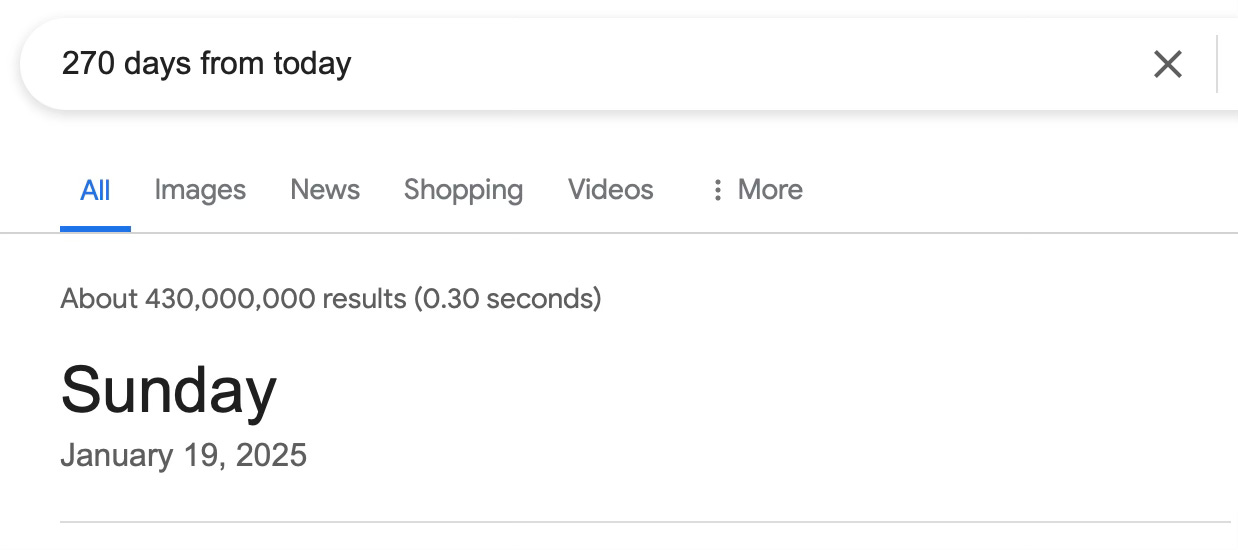The TikTok divest-or-ban bill is law - DSTC #1
TikTok's divestment deadline is inauguration eve 2025? Didn't see that coming.
It is a basic stance of Here It Comes that we can be confident that big changes are coming when it comes to US-China relations, technology, and climate, but it’s going to be hard to predict what exactly is on its way. Living with, being honest about, and even teaching uncertainty is one of the privileges of working as a university researcher, rather than as a decision maker in government or business. Nonetheless, there are times when people ask what I think will happen and I lack the fortitude to demur—and whether I share my predictions or not, I often have a gut feeling.
Today I’m introducing Didn’t See That Coming (DSTC), which I intend to be an occasional series at Here It Comes, in which I discuss things I got wrong—publicly or privately—or never anticipated. Readers are welcome to point out times where I’ve been wrong, which will become candidates for future DSTC entries. I already have a few in mind.
As always, thanks for reading. If you have not subscribed, please do so. If you wish to support this effort and have the means, please consider a paid subscription.
The TikTok divestment-or-ban bill is law in April 2024. Didn’t see that coming!
As I told a number of people over the last few weeks, while I wasn’t confident what would happen to the TikTok bill that passed rapidly in the House, I thought it looked like the Senate (perhaps in coordination with the election-year Biden team) would let the matter lie dormant until after the election. While I’ve elsewhere predicted, most recently in this space, that TikTok most likely would one day not be able to operate in the United States with Chinese ownership, I thought this legislative effort would drag on longer or fizzle.
The source of my surprise: House leadership not only came up with a way to pass Ukraine and Israel aid, but also duct taped the “Protecting Americans from Foreign Adversary Controlled Applications Act”1 to the side of the thing, setting it up for must-pass status in the Senate. Biden had already said he’d sign the TikTok bill if it reached his desk, so that was no surprise.
A smaller matter but certainly one I didn’t see coming: The law happens to have passed on a day when the deadline for divestment, now extended to 270 days, would land on the eve of next year’s presidential inauguration.

Assuming the “270 days after the date of the enactment” clock starts today, on inauguration eve: ByteDance will have divested from TikTok; some legal process will have blocked enforcement of the law; or Biden will face the choice of whether to let a TikTok ban go into effect or grant an extension of up to 90 days to get a deal done. TikTok could be seeking amnesty at the Resolute Desk alongside the usual stack of potential pardons and commutations.
A big f— deal
Timing and parliamentary maneuvering aside, take a moment to recognize the significance of this moment. Biden today opened a new era of US Internet censorship based on country of ownership (a proxy for “control”) and a presidential declaration of a national security risk. Well, more immediately he opened a round of litigation, testing of the limits of US and Chinese sovereignty and the US commitment to freedom of expression. I’ll try to refrain from developing any overconfident hunches about how this will all turn out.
Future DSTC candidates…
Why not preview a couple things I’ve considered writing up.
China’s government was able to lock nearly all of Shanghai’s population in their homes for weeks on end. DSTC!
The US pull-out from the Trans-Pacific Partnership has been enduring. DSTC!
What else have I blundered on? Drop me a line if you have something in mind.
About Here It Comes
Here it Comes is written by me, Graham Webster, a research scholar and editor-in-chief of the DigiChina Project at the Stanford Program on Geopolitics, Technology, and Governance. It is the successor to my earlier newsletter efforts U.S.–China Week and Transpacifica. Here It Comes is an exploration of the onslaught of interactions between US-China relations, technology, and climate change. The opinions expressed here are my own, and I reserve the right to change my mind.
PAFFACAA? Anyway, shouldn’t it be “Foreign Adversary–Controlled”?



